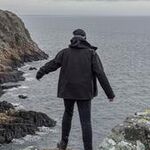Bloggaren är Jeff Mercier som jobbar på PGHM i Chamonix
http://jeffmercier.blogspot.fr/2013/05/le-mont-blanc-interdit-pour-les-nuls.html?spref=fb
The level of the Royal channel side Saint Gervais, in ideal condition allows any person with a good constitution to reach the summit of Mont Blanc without mastering all known mountaineer warned elements (Se and how to properly encode achieve, and how to stop it slipping, falling into a crevasse and how to go back, and how to treat MAM, weather signs and how to interpret them, and how to move fog, bad weather and how to protect themselves ....)
The conclusion: a lot of people trying to bump the Mont Blanc by the Royal way of Saint-Gervais WHAT CAUSES THAT infrastructure present on its common (ie under his responsibility) are overwhelmed WHAT CAUSES development of alternative accommodation, camping and bivouac, generating pollution in the form of garbage and human waste ... BUT since June 14, 1951, the commons of the Mont Blanc located more than 2000 meters were classified (Law of 2 May 1930 on the protection of sites). This area has been extended by Ministerial Decree 16 June 1976.
*This classification has the effect of prohibiting camping and camping throughout the area. (Orange area on the map below).
Exactly the law says that "camping is allowed everywhere in France where he is not allowed." Bivouac is a synonym camping.
To implement this "new old rule, the prefect of the Haute-Savoie assigned to the police mission to enforce the order. For 2013 summer season, so 55 days will see a pair of men in blue on the edges of trail around the Tête Rousse refuge.
Their mission will be to remember the rule for mountaineers. However, in this context, the police can not search backpacks mountain climbers.
As for any of the offenses, breach of a ban on camping / bivouac in an area is classified under the Penal Code.
The Penal Code classifies the offense as a misdemeanor punishable by a maximum fine of 9,000 euros (final fine is determined by the court). This fine is not match a sentence. This means that the police can used coercive measures against "offenders" (ie: not boarding force, handcuffing ...). However under Article L341-21: "The officers found the offenses referred to in Articles L. 341-19 and L. 341-20 may proceed to the seizure of the object of the offense ..." . Subject of the offense: the tent.
What can actually happen to those who try to camp on the royal road outside regulatory location?
- Principle of departure: tent set up, completed offense.
- Case 1, said the world's Bears: The police are coming, they politely ask for a dismantling of the tent, offenders aquiesseront and dismantle the police confiscate the tent. Offenders can go to the shelter if there is room, continue the climb or descend into the valley. Before leaving, the police will report the identity of the "offenders" by presenting an official document and convene, as soon as they return to drafting a legal proceeding.
- Case 2: The police will arrive, they politely ask for a dismantling of the tent, offenders refuse. Cops dismantle the tent from the outside because in this context, they can not get inside. Offenders remain stoic, the police confiscate the tent but let offenders get their material which is inside. Before leaving, the police will report the identity of the "offenders" by presenting an official document (the identity check is legal as soon as the person has committed an offense). If they have no official document, this policeman can retain up to 4 hours on site to carry out checks (Art 78-3: If the person refuses or s unable to prove his identity he may, if necessary, to be held on site). After a period of 4 hours, the person is free to go. The inability to prove his identity does not constitute an offense. It is the refusal to give his identity which is illegal.
Generally, the police determine identity. The infringement procedure is then set at the campsite as before.
- Case 3, called "Simon and sherpas" The police are coming, they politely ask for a dismantling of the tent, offenders refuse. Cops dismantle the tent, offenders get angry and throw stones at the men in blue (or any other form of violence). Offenders are hysterical, completely upset, the police should handcuff them for transport by helicopter. The result will be in custody. Sad scenario, "A" newspapers ....
For camp, read sleeping bag instead of a tent. The rest is the same.
The application of this rule creates an access control via St Gervais MB drastically in alignment with the proposed number of sleeping.
Is currently 100 seats on all 2 Taste (80 old / 20 for the new one) because it takes the departmental safety committee to open the new full speed (120). It will add 74 seats of the Tête Rousse refuge: 174 is in a first time and then 194 after a favorable opinion of the Committee.
This strict application makes access to paying mountain (60 euros half board continuity without the refuge of Taste, 26.80 to Tete Rousse). In 2004, the mayor asked the legislature to amend the text to construct a base camp at Tête Rousse. This free site has a capacity of 50 seats. But beware, once reached 50 seats, the farm site. it will wait until space is available from optimistically, we can consider a minimum turnover of 2d.
A quick calculation: the period June 15/15 September, the 90d fishy. 45j x 50 people x 2 = 4500 people per square open to campers ascents. In another way of looking at things, 4500 Free ascents if we take the route on foot from Les Houches.
A bold solution (intelligent?) Has the merit of doing things BUT solitary initiative (one common) which does not solve the problem of enthusiasm for this mountain move.
The decision to go from nothing to everything in one season, without having tried more persuasive and less coercive solutions, is the guarantor of difficult situations. Information regarding the ban is currently more than discreet in France. What is it with climbers Romanians or Turks?
The presence well known to all, tents "suckers" (sublet tents) has never been treated, this was a "real" problem.
2 pollution are human waste and garbage, installation of dry toilet systems at critical points solve a large volume of first issue. For the litter problem, Europeans in rich countries who travel to Everest are hardly the model of cleanliness. I know this answer does not address the problem but then again facing a problem of education than law.
Want to ban the bivouac, it's just to prove that we have not understood the practice of mountaineering!
The scenarios that I hope I never see:
***- The night out will not help the flow of fans being in unfamiliar territory. In the area between the Death Row and the refuge of Taste, the slightest deviation leads in areas of rocky rotten => increased risk of rockfall. For those who know the area, the concentration of 124 climbers to leuleu tail is reasonable?
****- The previous point leads to an over-tired compared to a departure from the Taste, which will result fatally undermined by the rise of the Bosses and that at the descent => increased risk of falling concentration.
*****- The descent between Taste and TR will be late for the last time either one or thawing is important => increased risk of rockfall. The evening is also conducive to violent summer storms.
******it is no exaggeration to bring "increased risk" by "number of deaths increased"
One day a fool will prohibit camping on all the Mont Blanc. Nothing can stop the Act provides .... The Mountaineers deserve, finally, the title of "Offenders of Useless"
http://jeffmercier.blogspot.fr/2013/05/le-mont-blanc-interdit-pour-les-nuls.html?spref=fb
The level of the Royal channel side Saint Gervais, in ideal condition allows any person with a good constitution to reach the summit of Mont Blanc without mastering all known mountaineer warned elements (Se and how to properly encode achieve, and how to stop it slipping, falling into a crevasse and how to go back, and how to treat MAM, weather signs and how to interpret them, and how to move fog, bad weather and how to protect themselves ....)
The conclusion: a lot of people trying to bump the Mont Blanc by the Royal way of Saint-Gervais WHAT CAUSES THAT infrastructure present on its common (ie under his responsibility) are overwhelmed WHAT CAUSES development of alternative accommodation, camping and bivouac, generating pollution in the form of garbage and human waste ... BUT since June 14, 1951, the commons of the Mont Blanc located more than 2000 meters were classified (Law of 2 May 1930 on the protection of sites). This area has been extended by Ministerial Decree 16 June 1976.
*This classification has the effect of prohibiting camping and camping throughout the area. (Orange area on the map below).
Exactly the law says that "camping is allowed everywhere in France where he is not allowed." Bivouac is a synonym camping.
To implement this "new old rule, the prefect of the Haute-Savoie assigned to the police mission to enforce the order. For 2013 summer season, so 55 days will see a pair of men in blue on the edges of trail around the Tête Rousse refuge.
Their mission will be to remember the rule for mountaineers. However, in this context, the police can not search backpacks mountain climbers.
As for any of the offenses, breach of a ban on camping / bivouac in an area is classified under the Penal Code.
The Penal Code classifies the offense as a misdemeanor punishable by a maximum fine of 9,000 euros (final fine is determined by the court). This fine is not match a sentence. This means that the police can used coercive measures against "offenders" (ie: not boarding force, handcuffing ...). However under Article L341-21: "The officers found the offenses referred to in Articles L. 341-19 and L. 341-20 may proceed to the seizure of the object of the offense ..." . Subject of the offense: the tent.
What can actually happen to those who try to camp on the royal road outside regulatory location?
- Principle of departure: tent set up, completed offense.
- Case 1, said the world's Bears: The police are coming, they politely ask for a dismantling of the tent, offenders aquiesseront and dismantle the police confiscate the tent. Offenders can go to the shelter if there is room, continue the climb or descend into the valley. Before leaving, the police will report the identity of the "offenders" by presenting an official document and convene, as soon as they return to drafting a legal proceeding.
- Case 2: The police will arrive, they politely ask for a dismantling of the tent, offenders refuse. Cops dismantle the tent from the outside because in this context, they can not get inside. Offenders remain stoic, the police confiscate the tent but let offenders get their material which is inside. Before leaving, the police will report the identity of the "offenders" by presenting an official document (the identity check is legal as soon as the person has committed an offense). If they have no official document, this policeman can retain up to 4 hours on site to carry out checks (Art 78-3: If the person refuses or s unable to prove his identity he may, if necessary, to be held on site). After a period of 4 hours, the person is free to go. The inability to prove his identity does not constitute an offense. It is the refusal to give his identity which is illegal.
Generally, the police determine identity. The infringement procedure is then set at the campsite as before.
- Case 3, called "Simon and sherpas" The police are coming, they politely ask for a dismantling of the tent, offenders refuse. Cops dismantle the tent, offenders get angry and throw stones at the men in blue (or any other form of violence). Offenders are hysterical, completely upset, the police should handcuff them for transport by helicopter. The result will be in custody. Sad scenario, "A" newspapers ....
For camp, read sleeping bag instead of a tent. The rest is the same.
The application of this rule creates an access control via St Gervais MB drastically in alignment with the proposed number of sleeping.
Is currently 100 seats on all 2 Taste (80 old / 20 for the new one) because it takes the departmental safety committee to open the new full speed (120). It will add 74 seats of the Tête Rousse refuge: 174 is in a first time and then 194 after a favorable opinion of the Committee.
This strict application makes access to paying mountain (60 euros half board continuity without the refuge of Taste, 26.80 to Tete Rousse). In 2004, the mayor asked the legislature to amend the text to construct a base camp at Tête Rousse. This free site has a capacity of 50 seats. But beware, once reached 50 seats, the farm site. it will wait until space is available from optimistically, we can consider a minimum turnover of 2d.
A quick calculation: the period June 15/15 September, the 90d fishy. 45j x 50 people x 2 = 4500 people per square open to campers ascents. In another way of looking at things, 4500 Free ascents if we take the route on foot from Les Houches.
A bold solution (intelligent?) Has the merit of doing things BUT solitary initiative (one common) which does not solve the problem of enthusiasm for this mountain move.
The decision to go from nothing to everything in one season, without having tried more persuasive and less coercive solutions, is the guarantor of difficult situations. Information regarding the ban is currently more than discreet in France. What is it with climbers Romanians or Turks?
The presence well known to all, tents "suckers" (sublet tents) has never been treated, this was a "real" problem.
2 pollution are human waste and garbage, installation of dry toilet systems at critical points solve a large volume of first issue. For the litter problem, Europeans in rich countries who travel to Everest are hardly the model of cleanliness. I know this answer does not address the problem but then again facing a problem of education than law.
Want to ban the bivouac, it's just to prove that we have not understood the practice of mountaineering!
The scenarios that I hope I never see:
***- The night out will not help the flow of fans being in unfamiliar territory. In the area between the Death Row and the refuge of Taste, the slightest deviation leads in areas of rocky rotten => increased risk of rockfall. For those who know the area, the concentration of 124 climbers to leuleu tail is reasonable?
****- The previous point leads to an over-tired compared to a departure from the Taste, which will result fatally undermined by the rise of the Bosses and that at the descent => increased risk of falling concentration.
*****- The descent between Taste and TR will be late for the last time either one or thawing is important => increased risk of rockfall. The evening is also conducive to violent summer storms.
******it is no exaggeration to bring "increased risk" by "number of deaths increased"
One day a fool will prohibit camping on all the Mont Blanc. Nothing can stop the Act provides .... The Mountaineers deserve, finally, the title of "Offenders of Useless"









